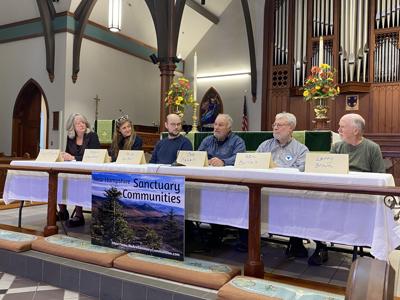More than 100 towns and cities around the Granite State are represented in a group of eight “sanctuary communities,” created in response to the expansion of Immigration and Customs Enforcement activity in New Hampshire.
According to Megan Chapman, a representative of the of the Mt. Washington Valley and Lakes Region Sanctuary Community, the group is an outlet for those looking to defend the rights of people “under attack by the current administration.” She said the number of towns and people involved are growing by the day.
“The Sanctuary Community movement is not an organization and has no leader,” the website states. “It is an idea around which people can organize themselves, creating groups from towns and communities in an area that the participants define.”
Republican lawmakers, as well as Sheriff Bill Wright, have spoken out against sanctuary communities, and defended laws put in place and signed into action by Gov. Kelly Ayotte.
Wright said zero arrests have been made through the federal partnership program by his office, and there have been no issues to speak of. While there is no rule to say they can’t wear masks, he said his personnel does not, even the SWAT team, which once was accustomed to doing so.
He said the ACLU reaches out to him frequently, sometimes through Right-to-Know requests, and he takes the time to sit down and address concerns or questions personally.
“This is a transparent office,” Wright said. “I am a constitutional officer, and this is where I am at.”
Chapman said the sanctuary movement is about community preparedness, as it has become clear state law enforcement and local jails have contracted with ICE. The Strafford County Jail has long detained immigrants, but last March, the Federal Correctional Institution in Berlin also began cooperating with ICE. Chapman said the red flags were starting to become obvious to her and others, who decided to make moves.
“If you look across New England, New Hampshire has been the spot to expand ICE detention,” Chapman said. “Passage of laws have showed that ICE is welcome here, and this is not what the majority of people want in this state.”
Chapman is referring to Ayotte signing SB 62 into law, which bans cities and towns from adopting sanctuary policies to stop police from assisting ICE. She also noted there have been various cooperation agreements with law enforcement agencies this year, and as a human rights attorney, is well versed in the law and these developments.
“Our position on this is that those are efforts to intimidate municipalities and people who have been choosing to make steps to protect communities and residents in towns across the state,” she said. “These efforts to put pressure on municipalities doesn’t stop citizens to organize together and do things that are 100% lawful.
“And we are 100% lawful."
Members of sanctuary communities support upholding the constitutional rights and protections Chapman says are coming under threat. She said an over-militarized law enforcement will do harm to the local community, instead of tackling violent crime.
“It is just ripping families apart.”
Organizing the eight sanctuary communities has been going for about six months. A press conference held in Concord on Oct. 28 officially announced a growing list of communities and members. Laconia is not included, but several Lakes Region towns and cities are.
In the Mt. Washington Valley and Lakes Region Sanctuary Community, the towns of Moultonborough and Sandwich are listed, and Franklin, Sanbornton and Tilton are in the Concord and Capital Region Sanctuary Community. The Plymouth Area Sanctuary Community includes Plymouth, Ashland, Bridgewater and New Hampton.
Other sanctuary community groups are North Country, Manchester and Merrimack Region, Monadnock Immigration Solidarity Collaborative, Seacoast Interfaith, and Sunapee/Upper Valley.
The sanctuary communities will be involved in activities including monitoring and videotaping ICE raids; providing witness information to media and local law enforcement; informing groups like churches, health facilities, schools and veterans groups about ICE actions; and writing letters and placing advertisements that oppose tactics that threaten citizens, notably legal immigrants.
Chapman said if ICE raids start to ramp up locally, trainings and mutual support will be organized to “meet the moment.”
“We are under the auspice of sharing commitment, and standing together in serving our communities,” Chapman said.
Sanctuary communities do not have a financial structure or any official funding source, and Chapman said activities are done through mutual aid between representatives. They often meet in free public spaces, or through video conference calls to minimize costs. Chapman called it a grassroots movement of concerned citizens doing what they can to support each other.
Ayotte recently spoke out against sanctuary communities, saying anyone who disrupts law enforcement activity will be prosecuted.
“Threats to law enforcement or efforts to obstruct them will not be tolerated in New Hampshire,” Ayotte said, according to a media release on Oct. 28. "We are not a sanctuary for criminals who have come into this country illegally, and the law I signed earlier this year reinforces that."
The Belknap County Sheriff’s Office is the only Lakes Region law enforcement agency part of the ICE 287 (g) partnership program, and the first in the state to have their entire full-time staff take part. The program authorizes deputies to perform immigration enforcement, such as serving warrants, and Wright said all nine full-time deputies have completed the training.
He told the deputies he would take the training, which he completed in about 2.5 hours, and would be continued education for them. While he knows all deputies have different political ideologies, despite not discussing that at work, each of them completed the training in their own time.
Wright said much of what it is on television is “ad-lib,” with ICE agents running around with facemasks on, making arrests. This is not the case in New Hampshire, he said, and not something for which he, his office, or ICE advocates.
“This is a small political narrative, and we aren’t interested in that.”
He hasn't seen any of those scenarios locally, he said, noting there are differences based on region.
He acknowledged there are ICE agents wearing masks in other parts of the country, however, saying this is notably the case in areas with large gang populations. Wright said he has experienced first-hand how dangerous areas like Washington, D.C., can get, especially with police officers being killed.
“They utilize facemasks to conceal their facial identities, so they and their family aren’t targeted,” Wright said. “There are unfortunately extremists who could pose a threat to these officers carrying out law enforcement functions.”
Wright said he believes the sanctuary community movement is a small group of people with political beliefs and views, who are doing their part to support their beliefs. While he doesn’t see anything wrong with that, he said the U.S. is a nation of laws, and people are expected to maintain order.
“I say 'no' to sanctuary cities, and say 'no' to sanctuary towns,” Wright said. “I fall right in line with our good governor.”
Sen. Timothy Lang Sr. (R-Sanbornton), the Republican Majority Whip, represents several towns listed in the sanctuary communities: New Hampton, Sanbornton, and Tilton in Belknap County; Sandwich in Carroll County; and Ashland, Campton, and Thornton in Grafton County. Lang wrote in an email on Nov. 6 that no matter what “these Open Borders advocates” say, state law prohibits sanctuary city policies across the state.
“Our law enforcement professionals will continue to enforce our laws to keep New Hampshire the safest state in the nation,” Lang said.
Rep. Tom Ploszaj (R-Center Harbor) said he is available to “listen, advise, and/or assists citizens, residents, individuals, or groups” in his district, which includes New Hampton and Center Harbor, who are in need of assistance due to ICE activities in the Granite State.
“Though I support the Belknap County Sheriff relationship with ICE, I am not part of law enforcement and I have no need to ask for identification from any individual who contacts me concerning their issues,” Ploszaj said.
For more information, visit wearesanctuarycommunities.com.


















(0) comments
Welcome to the discussion.
Log In
Keep it Clean. Please avoid obscene, vulgar, lewd, racist or sexually-oriented language.
PLEASE TURN OFF YOUR CAPS LOCK.
Don't Threaten. Threats of harming another person will not be tolerated.
Be Truthful. Don't knowingly lie about anyone or anything.
Be Nice. No racism, sexism or any sort of -ism that is degrading to another person.
Be Proactive. Use the 'Report' link on each comment to let us know of abusive posts.
Share with Us. We'd love to hear eyewitness accounts, the history behind an article.